Well, hello friends!
Welcome to week X of our pandemic updates.
Fortunately, this week isn’t so somber. Not cheerful, but less terrible than the last couple of weeks.
You know the drill: we will review the bad news, followed by the good news. I’ll share my most commonly asked question of the week and end on my silver lining.
The bad news
More than 151 million cases of COVID-19 had been reported worldwide. Over 3.1 million people have been reported to have died from COVID-related illness.
Canada has had over 1.2 million confirmed cases of COVID-19. Over 24 000 Canadian have died.
ICU admissions are at record highs and continue to climb. The Ontario healthcare system is still under incredible pressure. The Ontario Science Advisory has found that workplace mobility remains too high, leading to increased risk for infection. They strongly suggest limiting essential workplaces and ensuring sick workers stay home and have financial support to do so.
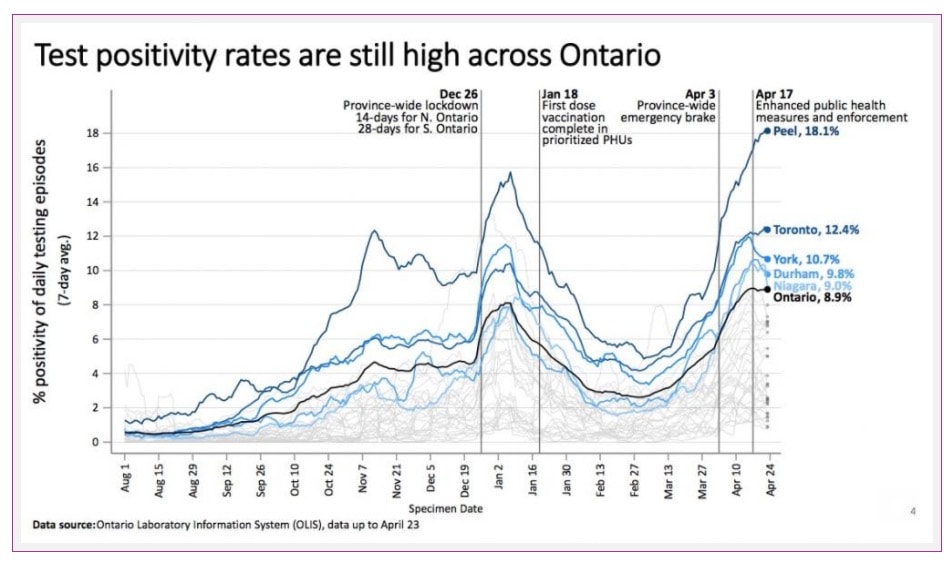
Though hospitalizations are down slightly, there has been virtually no change in the number of patients admitted to the ICU, with almost 900 people admitted due to COVID-related illness.
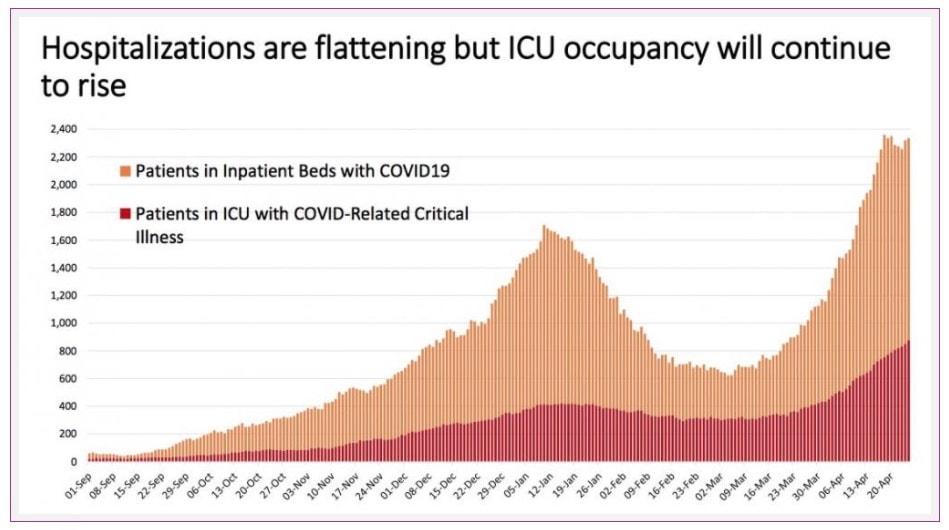
Variants of concern remain a significant threat, as they spread more quickly and can cause more significant illness. Ontario is hoping to suspend the arrival of international students to help slow the spread of COVID-19. The Premier has repeatedly blamed the pandemic’s third wave on “porous borders.” “We will never get ahead of this virus if we can’t keep these deadly new variants out of our country,” he has said.
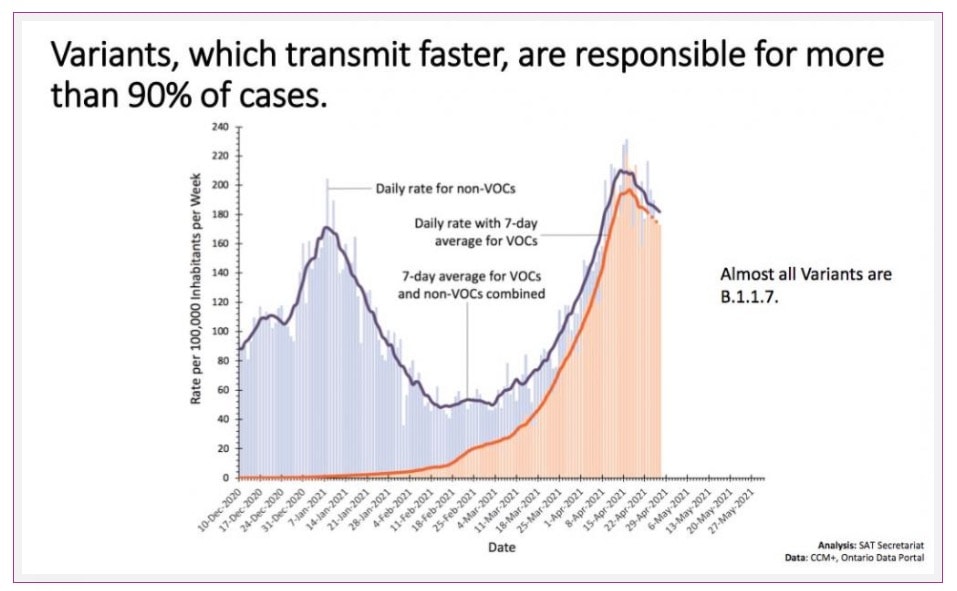
The United States announced that travel from India will be restricted as their cases continue to soar, and we see an emergence of dangerous coronavirus variants of concern. India is reporting close to 400,000 new cases a day and 3,500 daily deaths. Unfortunately, the data has been insufficient to know precisely what is going on. Over 350 scientists signed an appeal last week asking the government to release data on viral strains, testing, and response to vaccines.
In other areas of the world, the B1617 strain (first identified in India and thought to be more contagious and deadly) has been isolated. Uganda has detected the variant, stirring fears that they may have a resurgence of cases just as their last wave has settled.
The surgical backlog continues to grow. Clearing the backlog will be an enormous challenge.
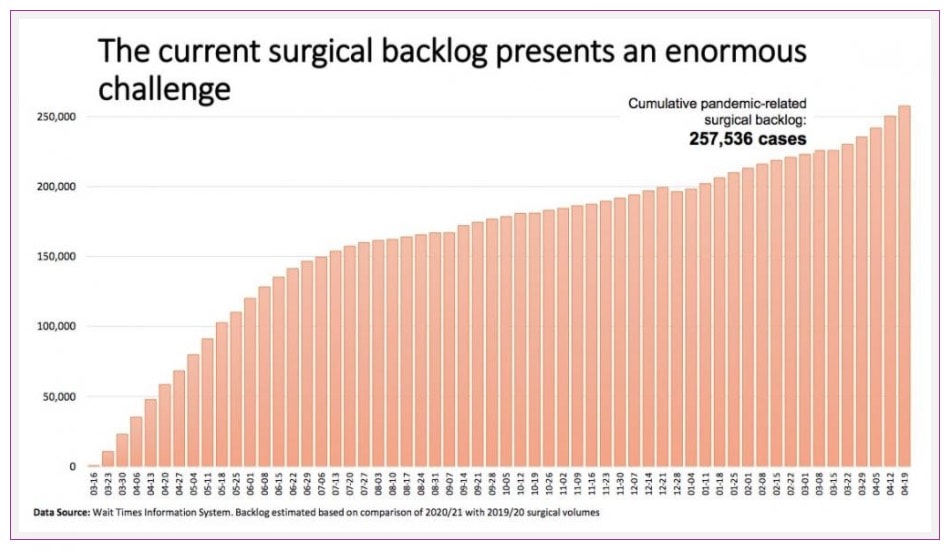
What’s the good news?
According to the Ontario Science Advisory, our efforts in Ontario are making a difference, and cases are plateauing, though not in all regions.
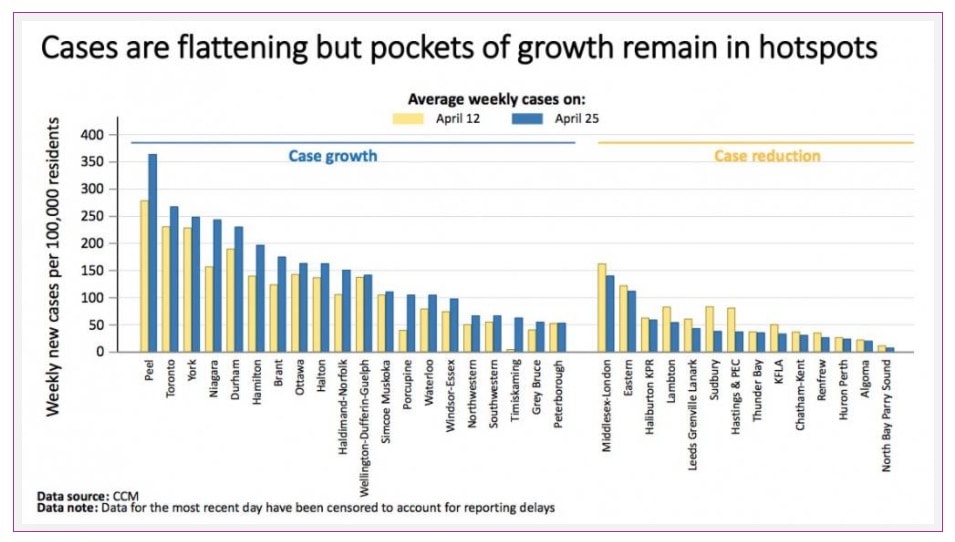
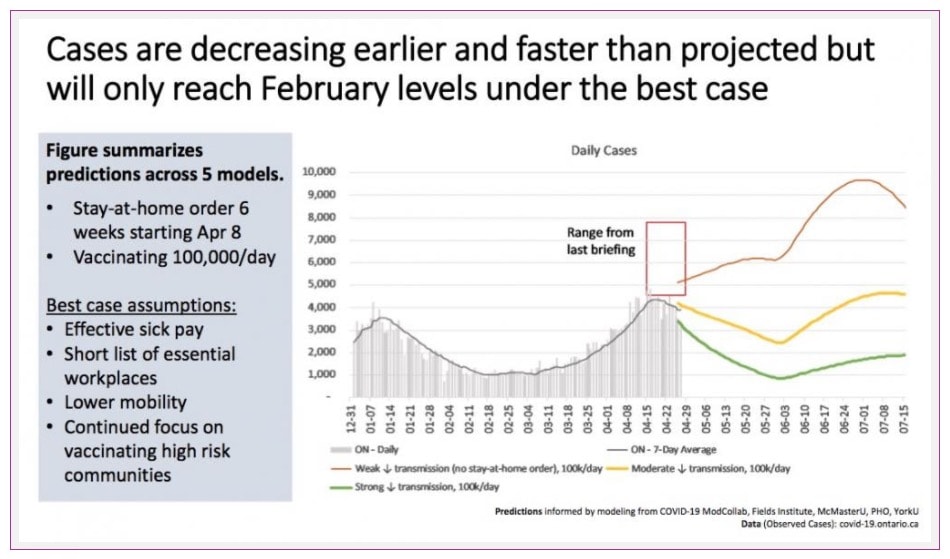
In Ontario, 40% of the adult population has received the first dose of a COVID-19 vaccine.
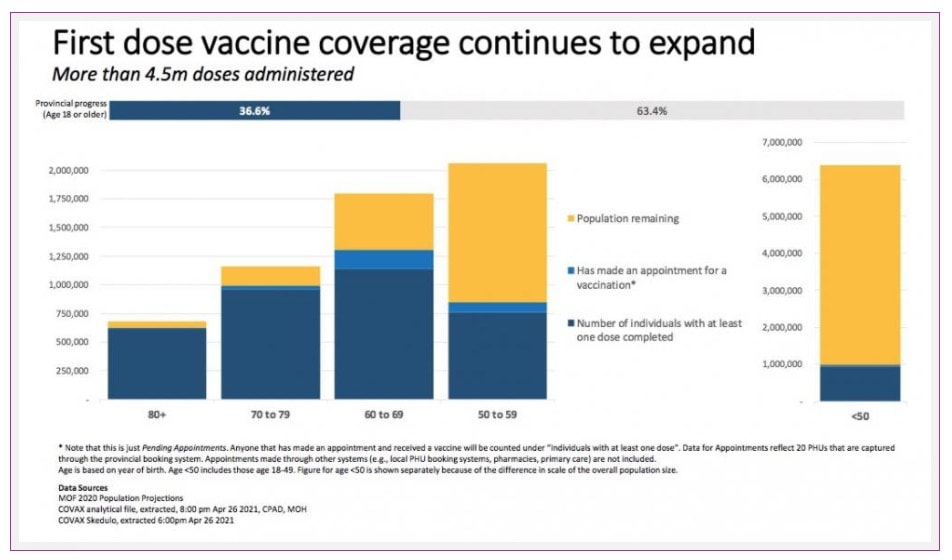
Residents of Quebec aged 50-59 can now book to receive COVID vaccines, and the province says anyone 18 years of age and older can get a vaccine by May 14.
Vaccination distribution is more equitable because it is focussing on hotspots. This is leading to fewer new cases and hopefully will start to decrease hospitalizations and deaths.
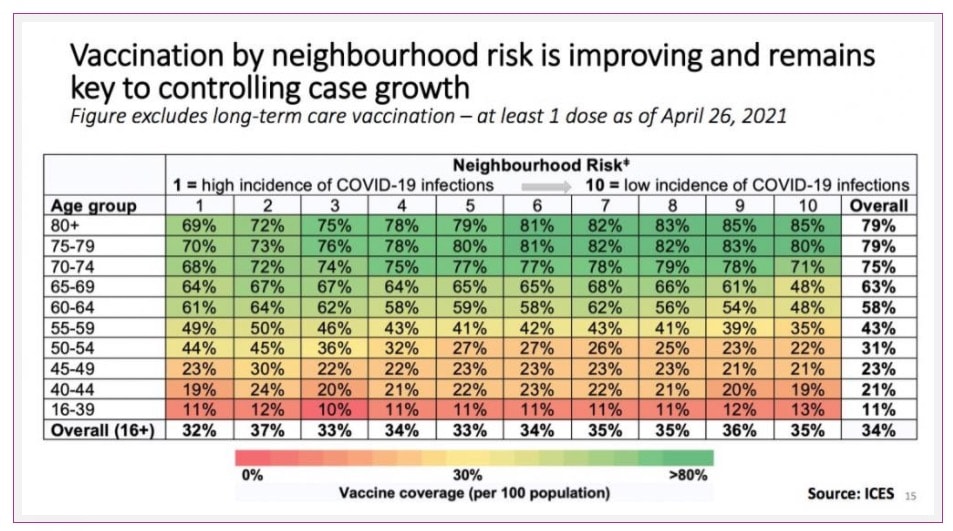
The Canadian economy has expanded 6.5% in the first three months of 2021, and the gross domestic product grew 0.4%. Canada is on track for healthy growth for the quarter, something we can all be excited about.
Question of the week
What exactly is a ‘caregiver’ when considering vaccine eligibility?
As we reviewed last week, phase 2 prioritization of COVID-10 vaccines is now ongoing.
During Phase Two, the following groups are eligible for vaccination:
- Adults between the age of 60 to 79 years.
- Individuals with specific health conditions and some primary caregivers.
- People who live and work in congregate settings and some primary caregivers.
- People who live in hot spots with high rates of death, transmission, and hospitalizations.
- Certain workers who cannot work from home.
I have been asked countless times this week if my patients’ parents classify as ‘essential caregivers.’
The ‘specific health conditions’ above refers to people with severe illness and increased risk of death regardless of age:
Highest-risk
- Stem cell transplant recipients.
- Organ transplant recipients.
- People with neurological diseases where respiratory function may be compromised, such as multiple sclerosis.
- Hematological malignancy diagnosed within the last year.
- Severe kidney disease.
High-risk
- Obesity with a BMI > 40.
- Treatments causing immunosuppression, such as chemotherapy.
- Developmental or intellectual disabilities, such as Down Syndrome.
At-risk
- Autoimmune disorders.
- Stroke and cerebrovascular disease.
- Diabetes.
- Dementia.
- Liver disease.
- Other cancers.
- Respiratory diseases.
- Spleen problems.
- Heart disease.
- High blood pressure with end-organ damage.
- Diagnosis of mental disorder.
- Substance use disorders.
- Thalassemia.
- Pregnancy.
- Immunocompromising health conditions.
- Other disabilities requiring direct support care in the community.
The ministry defines an essential caregiver as someone “providing direct, frequent and sustained in-person personal care and/or assistance with activities of daily living to the individual. The health condition of the individual requires ongoing reliance on the care and/or assistance from an essential caregiver.”
Primary caregivers to those with highest-risk health conditions only, such as caregivers to people who received stem cell or solid organ transplant, are eligible to receive the vaccines, not caregivers of those other categories, at least not yet.
Please talk to your physician about your eligibility for a vaccine.
The silver lining of the week
I am an extrovert and really need to be surrounded by people all the time. It gives me energy. Before the pandemic, I loved my social life, and clearly, it has changed in the last year. But I am not missing all the running around as much as I feared.
I am home with my husband and kids a lot.
I connect with friends on virtual dates or distanced and masked walks a few times a week.
I feel I am connecting more than I was before, as we are talking about our turmoil and stresses and being open and honest and raw.
I am grateful for this. My circle is smaller, more intimate. And I am closer than ever to my crew. I suspect you have experienced the same.
I hope you and your families are healthy and safe.
Please continue to distance and mask when with others you don’t live with, even when outside. Indoor activities still pose a significant risk and should be avoided when possible.
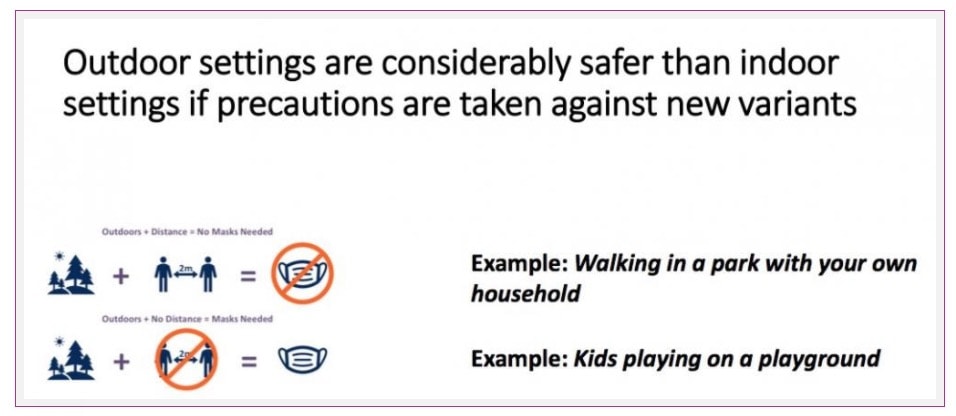
Have a great week!
See you, next week friends,


![[Dr. Dina News] IMPORTANT UPDATE re. VIRTUAL CARE](https://drdina.ca/wp-content/uploads/2021/01/dr-dina-kulik-kids-and-virtual-care-1a-400x250.jpg)
![[Dr. Dina News] COVID-19 Vaccine for Infants and Young Children.](https://drdina.ca/wp-content/uploads/2021/04/dr-dina-kulik-kids-and-vaccines-400x250.jpg)
![[Dr. Dina News] COVID-19 Vaccine for Infants and Young Children.](https://drdina.ca/wp-content/uploads/2022/04/DRD-1-400x250.jpg)






